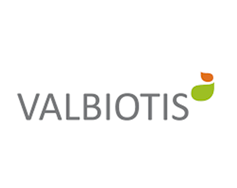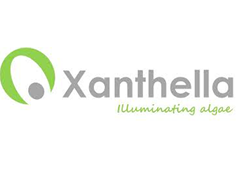/Discover the 7 BBMBC's Partners
• University of La Rochelle (FR)
• VALBIOTIS (Private company - FR)
• Conference of Peripheral Maritime Regions of Europe (CPMR)
• Universidad Católica de Valencia (ES)
• University of Stirling (UK)
• Xanthella (Private company - UK)
• CIIMAR (PT)
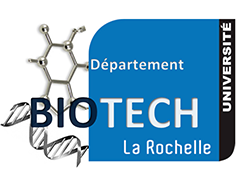
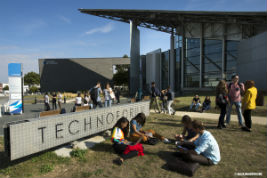 University of La Rochelle is the Lead Partner of the BBMBC project.
University of La Rochelle is the Lead Partner of the BBMBC project.
The Biotechnology Teaching Department associated with the Apprenticeship Formation Unit and the Lifelong Training and Employability Department are members of the University of La Rochelle.
The University of la Rochelle (ULR) was created in 1993 and participates in various European programmes related to training and research. ULR delivers Bachelor’s, Master’s and Doctoral degrees in various fields. The University of La Rochelle offers multi-disciplinary curricula which are structured around the 3 cycles degree structure (BMB / LMD) and in four main fields (Science, Technology and Medicine - Arts, French, Languages - Social Sciences and Humanities - Law, Economics and Management). This offer was designed to allow students to follow their own study paths in undergraduate study, adult education or Professional Experience Accreditation. Subjects are available at the Bachelor’ degree level; there are also BSc and Master programmes in applied Science.
The Biotechnology teaching department is directed by Pr. Jean-Marie PIOT and co-directed by Dr. Stéphanie Bordenave-Juchereau. The Biotechnology Teaching Department of the University of La Rochelle offers Bachelor degrees and post-graduate qualifications with a major in Biotechnology. It currently employs twenty full-time members of staff in teaching and research and more than 120 postgraduate students. Current specializations include Agricultural and Food Biotechnology, Enzymology, Microbiology, Molecular Biology, Nanobiotechnology, Structural Biology, Immunology and Pharmacology. Each member of the academic staff conducts research in a CNRS laboratory (CNRS 7266 LIENSS) and performs a wide variety of molecular, biotechnology and general microbiology projects. Their main research activities consist of the biotechnological and chemical exploitation of marine biodiversity in order to produce/extract new pharmacological constituents from marine micro/macroalgae, bacteria, invertebrates and so on. They are working on extracted natural pigments, peptides, polysaccharides and lipids active against cancer, metabolic disorders or infectious diseases. They have sound experience in green chemistry, extraction, purification, structural and functional characterizations of organic molecules. Transfer of biotechnological innovations to private sector is common in the field of health, bioprocesses and health.
In addition to this partnership, members of the Department have established a strong collaboration network with other blue-based industries and also biotechnological industries such as Seprosys, Laboratoires Lescuyer, Innov’ia, Greentech, IDCAPS and Chevalait. Within the University of La Rochelle and the Regional Education and Research Apprenticeship Center of Poitou-Charentes, the Apprenticeship Formation Unit is engaged in developing training both in apprenticeship and professional training contracts, by supporting prospective learners and employers in this approach. It is at the interface between the academic world, the socioeconomic world and institutional partners.
The lifelong learning and employability department of La Rochelle University is a unique structure that aims to help students and workers find the right course for the right job. This department oversees academic and vocational orientation for students as well as providing job counselling for students and graduates. One of its activities is lifelong learning for professionals: organisation support for lifelong courses, personalised mentoring and financial advice.
VALBIOTIS wishes to provide solid solutions designed to prevent risk factors and conditions for developing cardiometabolic diseases (e.g. diabetes and NASH).
VALBIOTIS has developed several products for type 2 diabetes prevention. With a unique global approach to multifactorial diseases, our team successfully halted type 2 diabetes evolution in db/db mice - the "gold standard" model - using polymolecular botanical complexes. A first product, Valedia, is now entering clinical trial phase in order to obtain a proprietary health claim for "diabetes prevention". Valbiotis has also developed a promising ingredient for "weight management", LipiDrive.
In this project, the company Valbiotis is the private partner of the Biotechnology Teaching Department. Valbiotis, based in La Rochelle since February 2014.
VALBIOTIS' advantage is its global approach and its capability to develop several products from a common scientific program, from well-adapted preventive nutritional solutions to solutions designed to provide nutritional support for patients. Preventive solutions with food status are also of major interest. They can be developed and sold in 4 to 5 years and there is a huge demand for effective products.
VALBIOTIS is involved in teaching knowledge and skills, since its members are involved with the Biotechnology Master programme of the University of La Rochelle.
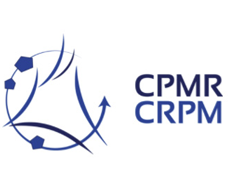
The Conference of Peripheral Maritime Regions of Europe (CPMR) is a unique organisation gathering around 150 member Regions located along Europe’s shoreline across the five European Sea-Basins (Atlantic Arc, Mediterranean, North Sea, Baltic and Black Sea).
Member Regions come from 28 countries and represent almost 200 million people in Europe. Members work together to ensure that EU institutions and national governments take into account their common interests, in particular in relation with blue growth potential in the maritime regions of Europe.
The CPMR is a non-profit organisation whose budget comes from the Membership fees paid annually by its members. Members are Regional authorities (i.e. public bodies.)
The CPMR has a long-standing experience on regional development and maritime policy priorities that it has been pursuing since its inception in 1973. Being the only association with a territorial work basis, the CPMR largely contributed to creating the European maritime policy in Europe. Today it is a regular partner of the European institutions, notably the Commission and Parliament, but also the Council formations such as the Informal EU Council on Cohesion and the Informal Council of Maritime Affairs where it has been involved as an observer for many years already.
Through its experience with the “Vasco da Gama: training for greener and safer maritime transport” project (hereafter VDG), the CPMR benefits from a solid knowledge and vision of the context regarding maritime training, employment, and mobility. Indeed, VDG observed that since the skills required from maritime professionals are getting more complex (due to technological developments and the increasing emphasis on multi-model supply chains), mobility was key in allowing students and seafarers to enhance their knowledge and competences.
As a network, the role of the CPMR in this project will be complementary to those of Universities and private partners. Mainly focused on Communication, the CPMR will also have a key role to ensure the political support coming from the Regions (as training is a regional competency) and to “multiply” and disseminate the information and results of the project across its six geographical Commissions.
The CPMR Atlantic Arc Commission will be particularly involved in this project which stems from the Atlantic Arc Commission “Innovation” Working Group. This working group is currently chaired by the Region Nouvelle Aquitaine who decided to focus their action primarily on blue biotechnologies. As a member of the CPMR and its Atlantic Arc Commission, the Region Nouvelle Aquitaine (in which University of La Rochelle is located) will be working in close relationship with the CPMR. They will ensure that the University of La Rochelle gets agreement for the creation of this unique and innovative Applied Biotechnology Blue Master II.

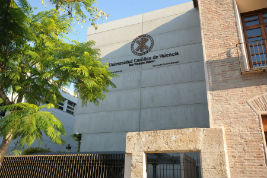 The Faculty of Veterinary and Experimental Sciences from Universidad Católica de Valencia (UCV) has extensive experience in elaborating and validating university study programs in a national and European context: BSc, MSc, PhD level and Erasmus Intensive Programs (IP). It is the only university in Spain to offer, since 2009/10, an official double BSc. degree in Marine Sciences and Biotechnology which provides specialization in Blue Biotechnology.
The Faculty of Veterinary and Experimental Sciences from Universidad Católica de Valencia (UCV) has extensive experience in elaborating and validating university study programs in a national and European context: BSc, MSc, PhD level and Erasmus Intensive Programs (IP). It is the only university in Spain to offer, since 2009/10, an official double BSc. degree in Marine Sciences and Biotechnology which provides specialization in Blue Biotechnology.
In addition, UCV regularly organises International Summer Workshops on Blue Biotechnology, bringing together professors from different universities and companies devoted to Marine Biotechnology.
Research at UCV is focused on several specific areas of Marine Sciences (physical oceanography, coastal management, marine biology, etc) and Biotechnology (biomaterial engineering, biomedical research, drug design, etc). However, there is also a strong focus on marine biotechnological projects such as microalgae biotechnology, search for biomaterials from marine origin and marine genomics.
In this project UCV will closely work with the private company PharmaMar (www.pharmamar.com) as an external advisor for the elaboration of the study programme and the development of industry-oriented courses through defining the training needs in the current Marine Biotechnology sector. PharmaMar is a world leading company in the research, development and commercialization of antitumoral drugs of marine origin and was the first company in the world to develop a marine-based cancer drug from discovery through to commercialization: Yondelis® (trabectedin). Over the years, it has received numerous awards that acknowledge its efforts to advance cancer research and innovation in the marine biomedical field. UCV has also gained support for this project from FEDACOVA (regional federation for agrifood businesses).
In addition to this support, UCV has established a strong collaboration network with other local blue-based industries (Bionos Biotech, Valenciana de Acuicultura, Alevines del Mediterráneo, etc) and marine research institutions (Scottish Marine Institute (SAMS), Institut de Ciències del Mar (CSIC), Instituto Español de Oceanografía (IEO), etc.) and also biotechnological industries such as Biopolis, LifeSequencing or Sistemas Genomicos. UCV’s partners include as well companies and institutions from other industrial fields indirectly related to Blue Biotechnology such as the textile sector or food ingredient research and development. This synergy between university and business results in an important two-way transfer of knowledge and student internships in real work space context.
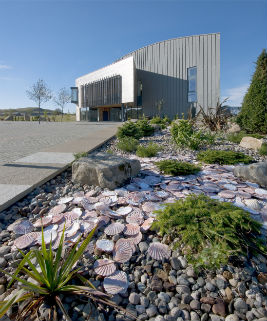 Xanthella Ltd was incorporated in 2009 to tackle the problems of the high cost of micro-algal cultivation systems and the lack of standardisation of photobioreactors used in research and scale up. Indeed, there is a bewildering range of photobioreactor types used in research, many of which are unique. The high cost of commercially available reactor systems also means that few laboratories can afford to run experiments that have sufficient replicates to give statistically sound results.
Xanthella Ltd was incorporated in 2009 to tackle the problems of the high cost of micro-algal cultivation systems and the lack of standardisation of photobioreactors used in research and scale up. Indeed, there is a bewildering range of photobioreactor types used in research, many of which are unique. The high cost of commercially available reactor systems also means that few laboratories can afford to run experiments that have sufficient replicates to give statistically sound results.
These problems - and the diversity of the algae themselves - makes it very difficult to compare the results of different groups and the literature abounds with apparently conflicting results. Scale up from bench top to pilot scale is also a challenging step. These problems are holding algal biotechnology back and increasing costs.
Xanthella’s ambition is to provide a range of photobioreactors that combine advanced design with cost-effectiveness that will overcome these problems around the lack of standardisation and make it much easier for both researchers and industry to advance algal biotechnology and production.
Xanthella’s special strength is in the control and supply of light through our understanding of LED technologies and photonics which allows us to manipulate light in a completely reproducible and effective manner.
Xanthella was founded by the award winning, marine biotechnology veteran Douglas McKenzie and he leads a highly experienced team of electronic engineers, phycologists and process engineers. The company is working with some of the finest research laboratories in Scotland to bring new technologies and processes to photobioreactor design.
Xanthella’s largest collaborative project is the highly innovative project: Algal Solutions for Local Energy Economy (ASLEE). The Funded by the Scottish Government's local Energy Challenge Fund, ASLEE project uses algal bioproduction to enable new industry in rural areas that simultaneously increases the strength of the rural circular economy by enabling better use of reneable electricity in grid-constrained areas as well as stranded timber and distillery coproducts. The project involves SMEs across the supply chain and from different sectors (Xanthella, VCharge, Ardnamurchan Estate, FAI Ardtoe) working with universities (University of Stirling; University of West Scotland), a global renewable energy consultancy (Wood Group - previously known as SgurrEnergy) and a local energy agency and charity (ALIEnergy). As part of the ASLEE activities a one day conference was organized, Empowering Rural Industries. The conference was held on the 20th March 2017, in the Technology and Innovation Centre, Glasgow and the aim is to turn this into an annual conference. The project will produce the UK's largest photobioreactor array at the Ardnamurchan estate.
Xanthella is based at the European Marine Science Park just outside of Oban, Scotland and alongside the Scottish Association for Marine Science’s laboratory at Dunstaffnage. This is home to the world-famous Culture Collection of Algae and Protozoa (CCAP).
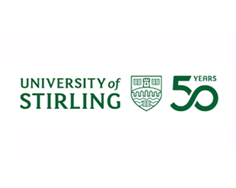
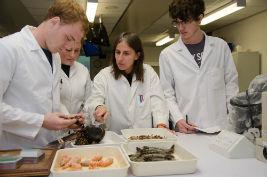 The Institute of Aquaculture (IoA) at the University of Stirling is the leading international centre in its field and the largest of its kind in the world.
The Institute of Aquaculture (IoA) at the University of Stirling is the leading international centre in its field and the largest of its kind in the world.
The IoA is a vibrant community of almost 350 highly skilled staff and students, with an annual operating budget of approximately £10 million. At the IoA, we bring together world-class researchers from a variety of disciplines in order to meet the challenges faced by aquaculture as it grows to meet global demand. Our research focuses on critical questions, such as how to develop strategies for sustainable aquaculture and aquatic food security, how to inform modern commercial markets, and how to support communities in developing countries so they have enough to eat.
Fundamental research on reproduction, genetics, aquatic animal health and welfare, nutrition, production systems, environments, markets, and social and economic impacts all play significant roles in what we do.
The IoA is an EU designated Large Scale Facility and an integral member of the Marine Alliance for Science & Technology for Scotland (MASTS). The Institute delivers undergraduate programmes in Marine Biology and Aquaculture, and is recognised internationally for excellence in postgraduate training. We offer Masters programmes in Sustainable Aquaculture, Aquatic Veterinary Studies, Aquatic Pathobiology, Aquatic Food Security and Marine Biotechnology, as well as degree studies at doctoral level.
We have collaborative research and training partnerships and links with many leading academic institutions and industry partners throughout Europe and the rest of the world. We attract funding for our work from a wide range of sponsors, including the Scottish Funding Council, UK Research Councils, UK Government departments, the European Union, national and international research organisations, foundations and trusts, and industry.

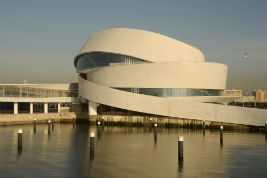 CIIMAR-Interdisciplinary Centre of Marine and Environmental Research of the University of Porto - is a multidisciplinary research institute whose mission is to develop exceptional transdisciplinary and transnational research, promote technological development and innovation and support public policies in Marine and Environmental Sciences.
CIIMAR-Interdisciplinary Centre of Marine and Environmental Research of the University of Porto - is a multidisciplinary research institute whose mission is to develop exceptional transdisciplinary and transnational research, promote technological development and innovation and support public policies in Marine and Environmental Sciences.
CIIMAR brings together 440 researchers, of which 220 have PhDs, covering an extensive diversity of scientific and technological skills and expertise allowing to address important economic and societal challenges with integrative approaches.
The scientific programme of the centre embraces an innovative-based strategy promoting market-oriented research and industry liaison activities, contributing to sustainable economic growth. CIIMAR also provides innovative solutions and products responding to current economic and societal challenges. Among them are the demand for high-quality seafood, new drugs and marine products for industrial and medicinal needs, water quality, sustainable fisheries, preparedness for and mitigation of oil and HNS spills, environmental monitoring & risk assessment, preservation of ecosystems services and ocean & coastal management.
Facilities
CIIMAR´s new state-of-the-art facilities for research, training and services are located at the heart of the maritime industry and services in the Northern region of Portugal (Leixões harbour). The centre features well-equipped laboratories, technological core platforms, high scale micro- and macroalgae cultivation and animal experimental facilities. CIIMAR integrates two research infrastructures of national and European relevance: European Marine Biological Resource Centre (EMBRC) and the European Multidisciplinary Seafloor Observatory (EMSO).
Innovation and Technology Transfer
CIIMAR is involved in clustering activities, participating in National and European Knowledge and Innovation Networks, relevant in the Marine Economy Sector (OCEANUS, FORUM OCEANO, BLUEBIO ALLIANCE, EUROMARINE, European Marine Board). The centre follows an innovation-based strategy to foster technology transfer, promoting market-oriented research and industry liaison activities. Disruptive ideas and technologies are driven to technology acceleration programmes, identifying opportunities for new products and services.
Science and Society
CIIMAR has an extensive and exciting Outreach Programme addressed to all society sectors. It is responsible for the development and implementation of several national and international science dissemination campaigns directed towards improving Ocean Literacy among students and general public.
At the regional level, the cooperation protocols with the City Councils of Vila do Conde and Matosinhos for the scientific and technological management of their Environmental Monitoring and Interpretation Centres (CMIAs) are of particular significance. CIIMAR was the first Portuguese research centre to become member of the European Network of
Science Centres and Museums (ECSITE), increasing its responsibility in the improvement of Ocean Literary.




